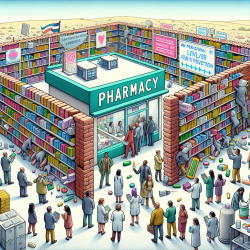Introduction
In the realm of pediatric health, ensuring optimal nutrition for infants is paramount. The research article "Global health policies that support the use of banked donor human milk: a human rights issue" sheds light on the critical role of donor milk banking in safeguarding the health and development of vulnerable infants. As practitioners, understanding and implementing these insights can significantly enhance outcomes for children, particularly those in need of specialized nutritional support.
The Importance of Donor Milk Banking
Donor milk banking offers a lifeline to premature and sick infants who may not have access to their mother's milk. The research highlights that infants fed with human milk, either from their mother or a donor, have a reduced risk of developing necrotizing enterocolitis (NEC) compared to those fed with formula. This underscores the preventive "medicine" aspect of donor milk, enhancing both the immediate and long-term health prospects of these infants.
Global Health Policies and Human Rights
The integration of donor milk banking into global health policies is not merely a health initiative but a human rights issue. International policies from the United Nations, World Health Organization, and UNICEF advocate for the promotion and support of breastfeeding and donor milk banking as integral components of child health. These policies provide a framework for countries to establish and sustain milk banking services, ensuring equitable access to this vital resource.
Practical Implications for Practitioners
For practitioners in the field of speech-language pathology and related disciplines, incorporating the principles of donor milk banking into practice can be transformative. Here are some actionable steps:
- Advocacy: Advocate for policies that support donor milk banking within healthcare settings and communities.
- Education: Educate parents and caregivers about the benefits of donor milk, especially for infants with medical needs.
- Collaboration: Collaborate with healthcare providers and policymakers to integrate donor milk banking into national health strategies.
- Research: Engage in or support research that further explores the benefits and implementation strategies of donor milk banking.
Encouraging Further Research
While the existing research provides a strong foundation, further studies are essential to continue advancing our understanding of donor milk banking's impact. Practitioners are encouraged to contribute to this body of knowledge, exploring new methodologies and outcomes that can inform future policies and practices.
Conclusion
By embracing the insights from the research on donor milk banking, practitioners can play a pivotal role in enhancing child health outcomes. This commitment not only aligns with global health policies but also champions the rights of every child to receive optimal nutrition and care.
To read the original research paper, please follow this link: Global health policies that support the use of banked donor human milk: a human rights issue.










